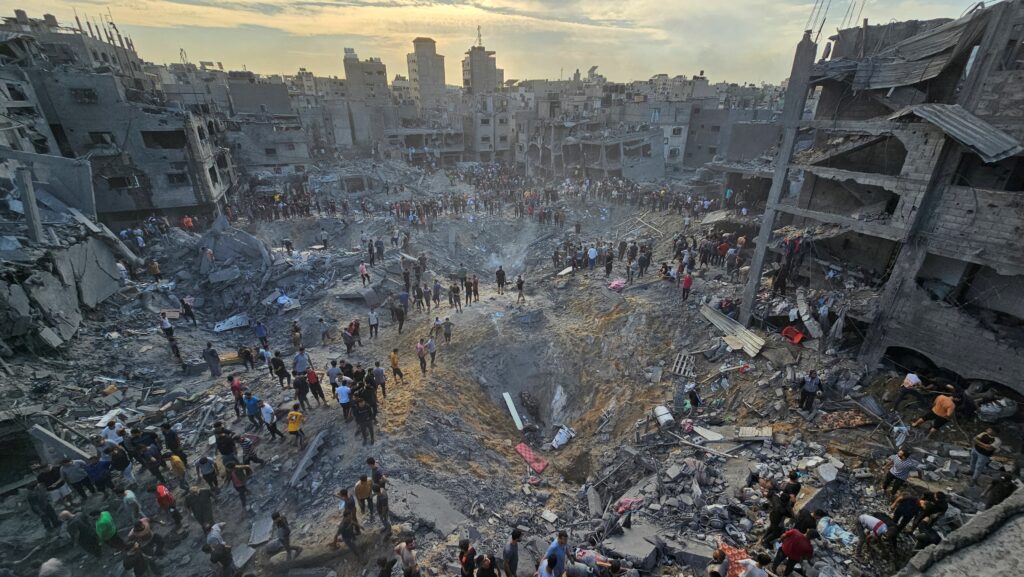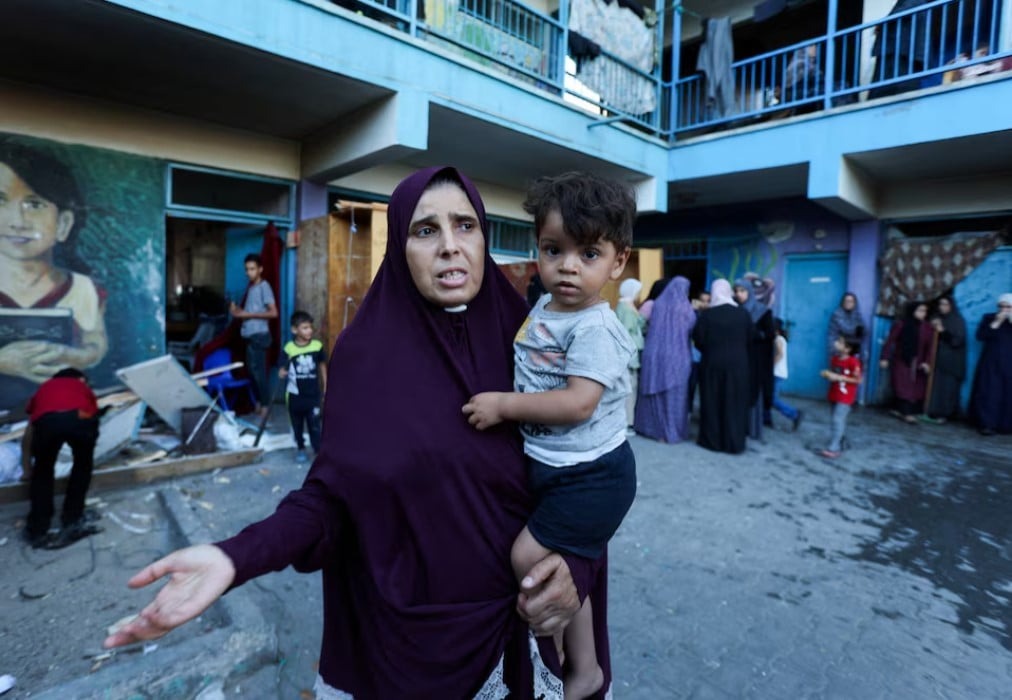16 citizens died in an Israeli air strike on a Gaza school.

"16 Civilians Killed in Devastating Israeli Air Strike on Gaza School"
Introduction
At least 16 citizens died in an Israeli air attack on a school in Gaza attacked 7 July. This happening has not only surprised the nation, but it has also strained international care to the current battle between Israel and Palestine. “Worldwidenesupdate” Understanding the significance of these circumstances requires examining the facts of the event, its result, and the broader claims on global relations and humanitarian efforts.

Background Information
The Israeli-Palestinian war has been an established and intensely rooted issue, marked by periods of intense violence and brief moments of anxious peace. Over the previous few months, pressures have intensified meaningfully, leading to recurrent clashes and military activities. Gaza, a closely populated area with limited resources, has often been at the center of these wars, sorrow huge humanitarian disasters.
Facts of the Air Strike
On [insert date], the Israeli military directed an air strike targeting a school in Gaza, resulting in the instant death of 16 people, including children and staff members. The building suffered massive damage, and the nearby area was also affected by the blast, causing more deaths and ruin.

Eyewitness Accounts
Survivors of the air strike have shared disturbing accounts of the incident. One teacher, who managed to escape the rubble, defined the chaos and terror as the building trembled and collapsed. Residents were quick to the scene to help with quick efforts, while emergency respondents worked tirelessly to tend to the injured and save bodies from the debris.
Response from Authorities
Israeli administrators have justified the air strike by claiming it was expected to eliminate a militant danger working from within the school. Palestinian leaders, however, have fated the attack as a war crime and called for worldwide involvement. The incident has also flashed extensive condemnation from many countries and worldwide governments, challenging an instant ceasefire and a thorough investigation.
Humanitarian Impression
The humanitarian impression of this air attack is deep. The loss of life, mainly between children, has shocked people and citizens. The destruction of the school also means the loss of a vital facility for education and housing. Humanitarian administrations are now immediately calling for aid to talk about the immediate needs of the affected people, including medical supplies, food, and psychological support for the shocked survivors.
Global Reactions
World leaders have spoken about their shock and disappointment at the incident. The United Nations has called for an emergency conference to discuss the circumstances, while worldwide human rights organizations are forceful for responsibility and justice for the dead. Media reporting of the air strike has been wide, with various outlets highlighting the plight of the Gazan population and the need for a peaceful resolution to the war.
Historical Incidents of Similar Nature
This is not the first time that citizen areas in Gaza have been targeted through military actions. Earlier incidents have also caused important deaths and worldwide outcry. By comparing these events, it becomes clear that the pattern of violence and the targeting of citizen infrastructure have severe and long-lasting penalties on the people.
Legal Implications
The air strike on the Gaza school increases thoughtful legal queries under international law. Attacks on citizen targets, particularly schools, are usually prohibited and could establish war crimes. Human rights organizations are calling for a thorough examination to control the validity of the attack and hold those responsible accountable.
Examination of the Circumstances
The political reasons behind the air strike are complex and fixed in the continuing Israeli-Palestinian war. From a military policy viewpoint, targeting a school, even if there were worries of militant activity, increases moral and legal concerns. This incident strains the already delicate relationships between Israel and Palestine and confuses efforts to a peaceful determination.
Peace Efforts and Diplomatic Actions
Despite the violence, there are continuing peace efforts and political actions aimed at resolving the war. Recent peace discussions, though challenging, seek to address the root causes of the war and find a permanent solution. The United Nations and other worldwide forms play a vital role in mediating these negotiations and providing care for peace creativities.
Personal Stories and Testimonials
The personal stories of those affected by the air attack highlight the human cost of the war. Families who have lost relatives, children who lived but are now shocked, and the community grappling with the result—all these accounts paint a bright picture of the disaster. These stories underline the need for sympathy, support, and a commitment to stopping such events in the future.
Media Reporting and Public Opinion
Media reporting of the air strike has been diverse, with some outlets directing on the humanity effect while others highpoint the political and military features. The public view is also divided, with social media platforms reflecting an extensive range of opinions and feelings. Examining media bias and the depiction of the incident helps in understanding the broader narrative and its effect on public awareness.
Future Implications
The long-term effect of this air strike on Gaza and the Israeli-Palestinian war cannot be understated. It not only worsens the humanitarian disaster in Gaza but also affects the political land and future generations. The predictions for peace remain uncertain, but events like this underline the vital need for a complete and permanent solution.
Conclusion
The Israeli air attack on a Gaza school, resulting in the deaths of at least 16 people, is a sad reminder of the continuing violence and its shocking effect on citizens. The incident has drawn international attention, prompting calls for responsibility, humanitarian help, and renewed efforts toward peace. The worldwidenewsupdate community must come together and talk about the origin reasons of the war to stop further loss of life and sorrow.
FAQs
1. What happened during the Israeli air strike on the Gaza school?
2.
The air strike occurred on [insert date], targeting a school in Gaza and resulting in the deaths of at least 16 individuals, including children and staff members. The building was heavily damaged, and the surrounding area also suffered significant destruction.
2. How has the international community responded to the air strike?
The international community has spoken in extensive condemnation of the air strike. World leaders, the United Nations, and numerous human rights organizations have called for an instant ceasefire, a full investigation, and answerability for those responsible.
3. What are the legal allegations of the air strike?
Under international law, targeting civilian sites, especially schools, typically violates prohibitions and constitutes war crimes. Human rights organizations are supporting a full investigation to control the validity of the attack and confirm fairness for the dead.
4. How has the air strike impacted the humanitarian circumstances in Gaza?
The air strike has had a deep humanitarian effect, resulting in the loss of life and the devastation of vital infrastructure. Humanitarian organizations are calling for instant aid to address the needs of the affected people, including medical materials, nutrition, and psychological care.
5. What are the prospects for peace following this incident?
The forecasts for peace remain uncertain, but the incident highlights the urgent need for a complete and lasting solution to the Israeli-Palestinian war. Continuing peace discussions and political efforts aim to address the origin causes and find a framework for permanent peace.



